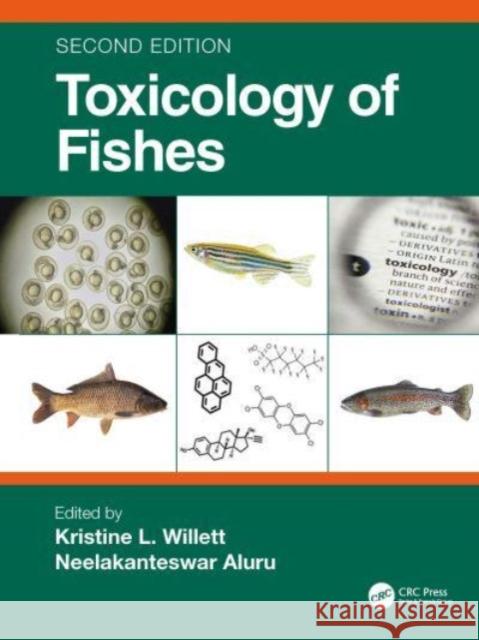Toxicology of Fishes » książka



Toxicology of Fishes
ISBN-13: 9780367749972 / Twarda / 2024 / 528 str.
This up-to-date, comprehensive handbook is devoted to the effects of chemical pollution on humans, animals and the marine environment, covering biochiemical and molecular aspects.
"Provides a useful resource for the regulatory toxicologist… well-presented and concise book worthy of a position on the bookshelf of all fish toxicologists."
—Jonathan Burke, Covance Laboratories Ltd, UK, in the British Toxicology Society Newsletter
1 Introduction. 2 Toxicokinetics in Fishes. 3 Biotransformation in Fishes. 4 Reactive Oxygen Species and Oxidative Stress. 5 Toxic Responses of the Fish Nervous System. 6 The Immune System of Fish: A Target Organ of Toxicity. 7 Toxicity Resistance: Physiological Acclimations and Evolutionary Adaptations to Chemical Stress. 8 Endocrine Disruption in Teleosts: Mechanisms of Endocrine Toxicity and Experimental Approaches. 9 Multi- and Transgenerational Health Effects of Exposure to Toxicants in Fish. 10 Epigenetics. 11 Proteomics and Metabolomics. 12 Adverse Outcome Pathways. 13 The Potential for Toxicity to Fishes from Micro and Nanoplastics, and their Additives. 14 Effects of Pharmaceuticals. 15 Oil Spills.
Kristine L. Willett, PhD is Chair of the Department of BioMolecular Sciences in the School of Pharmacy at the University of Mississippi (UM). A professor of Pharmacology and Environmental Toxicology, she has taught both graduate and undergraduate courses in toxicology and environmental toxicology at UM since 2000. Dr. Willett earned her BA in Chemistry at the University of North Carolina and a PhD in Toxicology from Texas A&M University. She was a Dreyfus postdoctoral fellow in environmental chemistry at Indiana University followed by an RJR Leon Golberg postdoctoral fellow in toxicology at Duke University. Dr. Willett’s research has been funded over the years by NIDA, NIEHS, NOAA, USGS, and the Army Corps of Engineers and resulted in 80+ manuscripts and book chapters. Throughout her career she has led research projects which were designed to fundamentally understand the molecular mechanisms underlying toxicity and/or shed light on the potential adverse outcomes due to relevant anthropogenic contamination. Her lab has studied the developmental, reproductive and multigenerational impacts of nanosilver, cannabinoid and benzo[a]pyrene exposures using fish models. She also studies consequences of environmental stressors on oysters. She serves as a Deputy Editor of Toxicological Sciences. She has been elected to leadership positions in the Society of Environmental Toxicology and Chemistry and the Society of Toxicology (SOT). SOT and American Association of Colleges of Pharmacy. (AACP) have also recognized her with undergraduate and graduate educator awards, respectively. At UM, she earned the 2022 Research and Distinguished Achievement Award and the 2017 Faculty Achievement Award.
Neelakanteswar Aluru, PhD is an Associate Scientist in the Biology Department at Woods Hole Oceanographic Institution (WHOI). Dr. Aluru earned his Bachelor of Fisheries Science at the Orissa University of Agriculture and Technology in Berhampur, India, followed by a Master of Fisheries Science (Aquaculture) from Kerala Agricultural University Cochin, India. He earned a Master of Science from the College of Fishery Science, University of Tromsø, Norway. He received his PhD in Biology from the University of Waterloo, Ontario, Canada where he studied influence of persistent organic pollutants on the endocrine stress axis in rainbow trout. He has held postdoctoral research appointments at the University of Guelph, Ontario Canada and at WHOI. Since 2012, he has been conducting research as an independent scientist at WHOI. His research interests are mainly focused in the field of environmental epigenetics, particularly the epigenetic processes involved in determining phenotypic (and/or developmental) plasticity in response to environmental cues/stressor exposures. His laboratory uses a variety of vertebrate and invertebrate model systems and employs a number of different molecular biology methods –gene-specific to high-throughput sequencing to study epigenetic modes of action. He is part of the Woods Hole Center for Oceans and Human Health.
1997-2026 DolnySlask.com Agencja Internetowa
KrainaKsiazek.PL - Księgarnia Internetowa









